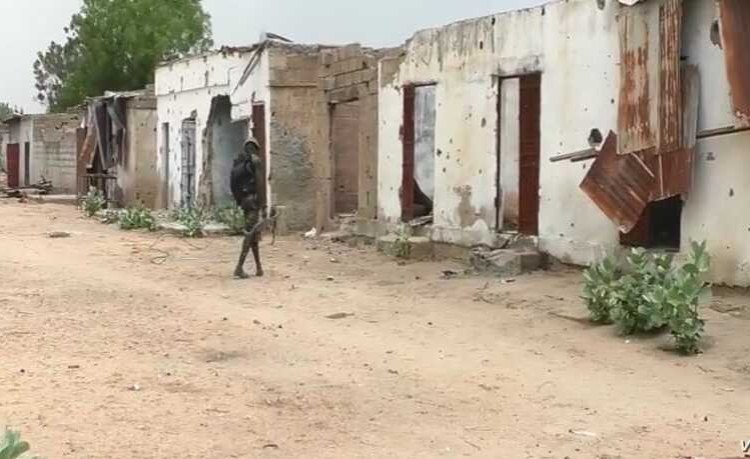The United States Government has described the humanitarian crisis in Nigeria’s North-east as one of the world’s most challenging and complex. U.S Consulate Public Affairs Officer, Stephen Ibelli, disclosed this at the Nigeria Info 99.3 FM “Security and Development Summit”, during a session on “US and Nigeria Security Assistance and Cooperation”.
The summit was in commemoration of the radio station’s 10th anniversary.
Ibelli pledged the U.S. government’s continuous support to Nigeria in the fight against insecurity. He said estimates by the Council on Foreign Relations, a U.S. think-tank, showed that more than 350,000 people had been killed in the North-east since 2009, while about three million people had been displaced across the Lake Chad Basin region.
Ibelli further said the trail of death, destruction, and personal losses inflicted by Boko Haram and ISIS-West Africa was immeasurable. He said the North-west also faced the threat of banditry, a type of organised crime that included kidnapping, armed robbery, murder, rape, cattle-rustling, and the exploitation of environmental resources.
According to the envoy,
“These armed groups have terrorised communities, killed and displaced thousands, hindered socio-economic development, and threatened democratic governance.
“There is also the farmer-herder conflict worsened by climate change, rising populations, and competition for dwindling resources.
“Disagreements between pastoralist and farmers that may have once seemed manageable and isolated have escalated into large-scale disputes that have resulted in burned villages, stolen cattle, destroyed farm produce, and violence.
“Illegal, unreported, unregulated fishing, oil bunkering, trafficking of weapons, narcotics, and people, as well as the on-going threat of Nigeria-based piracy and armed robbery at sea also pose a major threat to commerce, economic development and the environment for not just Nigeria, but the entire region.”
Ibelli said countering these threats was a common goal for Nigeria and the United States. He stressed that the US mission in Nigeria would continue to work in concert with the Nigerian government, fellow diplomatic missions, and civil society to address the multi-faceted dimensions of conflicts and armed violence in the country.
He said the United States Agency for International Development (USAID) “based in our Embassy in Abuja has the lead on coordinating the US government’s humanitarian response, as well as helping to rebuild the basic civil institutions essential to re-establishing civil and social life in the hardest hit states and areas of northern Nigeria.
“As some of you may already know, the United States is the largest humanitarian donor in response to the North-east crisis, providing $1.45 billion since 2015 and supporting almost two million conflict-affected households.
“Our Public Affairs Section at the Embassy in Abuja also oversees our Countering Violent Extremism messaging efforts and provides support to train a cadre of indigenous messengers best poised to reveal the falsity and vileness of Boko Haram and ISIS propaganda. PAS Abuja also awards grants in support of Nigeria’s response to the on-going instability in the North-west and North-central regions.
“Since 2017, Department of State and Department of Defense security assistance for Nigeria totals approximately $650 million. In addition to this assistance, the Super Tucano sale is valued at almost $500 million and remains the United States’ largest Foreign Military Sale in Sub-Saharan Africa.”
On the import of the summit, he said it provided a valuable forum for frank conversations on critical shared priorities, including security cooperation, humanitarian assistance, and stabilisation efforts.
He said “without security, it is impossible to have the stability and environment that is conducive to robust economic development and capacity building.”
While acknowledging the fundamental role of a free and independent media in a democracy, Ibelli said journalists helped ensure that citizens were informed and exposed to diverse perspectives on key issues, such as national security.
According to him, “Well-informed citizens make countries stronger, and the exchange of ideas is the foundation for accountable governance and development in addition to the economy. To this end, the United States will never rest in supporting initiatives that promote press freedom, access to information and freedom of expression.”
Ibelli described the United States as Nigeria’s partner of choice against insecurity, adding that a military response alone cannot lead to sustained peace.
He stated,
“Nigeria’s success does not just depend on its military effectiveness on the battlefield – it requires improvements to the economy, fiscal transparency, violence free elections, anti-corruption, anti-nepotism efforts, a welcoming business environment for investors, and governance off the battlefield as well.
“In other words, a comprehensive, all of government response is necessary to build a better future in all parts of this great country.”
Source:
